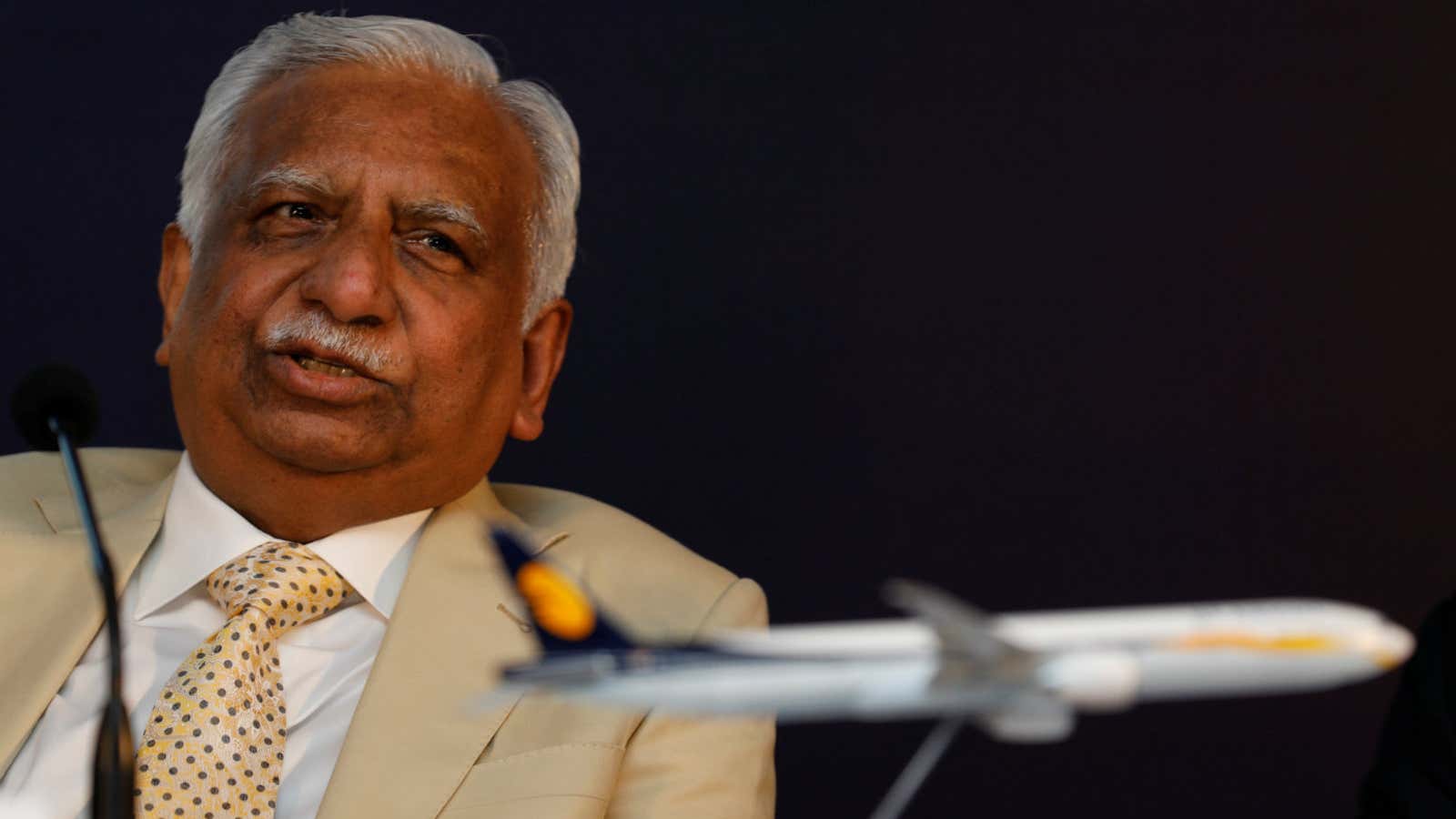The moment of truth may have finally arrived for Naresh Goyal.
The founder and promoter of India’s oldest private carrier, Jet Airways, may be on the verge of ceding his majority stake in the airline he has captained for over 25 years.
In a filing to the stock exchanges on Feb. 14, Jet, which defaulted on its debt recently, announced that its board has given the green light to issue 114 million fresh shares of the company to a consortium of banks led by the State Bank of India (SBI). This essentially paves the way for the lenders to become the largest shareholders in the company.
The carrier, which owes the banks over Rs10,000 crore (around $1.5 billion), also announced its fourth consecutive quarterly loss yesterday (Feb.14). This has added urgency to the debt recast, which has long been in the making.
Back of the envelope calculations suggest that after the allotment of new shares to banks, they will end up owning a little over half of the airline, while Goyal’s shareholding will be reduced to 25% from the current 51%. Abu Dhabi-based Etihad Airways, which currently owns a 24% stake in Jet, may also see its ownership halve.
Though the contours of the new shareholding pattern are still hazy, Goyal can certainly not retain a majority stake in the proposed scheme of things.
The “bank-led provisional resolution plan” (BLRP), proposed by SBI, India’s largest bank, now requires approval from Jet’s other lenders, the Indian Bankers’ Association, and Etihad, among others, according to the filing. The airline has called for an extraordinary general meeting of its shareholders on Feb. 21, to seek their nod for the deal, which will help plug the airline’s funding gap of Rs8,500 crore.
As per the restructuring plan, banks will convert their debt in Jet into equity shares and become co-owners in the company. The plan also envisages fresh capital infusion and sale of assets, including aircraft, according to the Feb. 14 filing.
The package, if approved, will give Jet Airways the much-need oxygen it needs to stay alive.
No festive cheer
Despite being a seasonally strong quarter, due to year-end travel and the holiday season, Jet Airways posted a net loss of Rs588 crore in October-December 2018. In the same period a year ago, the airline had clocked a net profit of Rs165.2. Revenues, too, dipped from Rs6,086 crore in October-December 2017 to Rs6,148 crore in the last quarter.
“Higher costs due to the price of brent crude and the depreciated Indian rupee impacted the airline’s overall business performance,” Jet said in a statement. The double whammy offset a 2.6% increase in revenue per available seat kilometre in the quarter.
Yet, despite similar macroeconomic headwinds, Jet’s no-frills rivals IndiGo and SpiceJet—India’s largest and fourth-largest carriers by market share in 2018, respectively—managed to post modest profits during this period. Competition from budget carriers in a market known for its so-called “two-cent fares” has left Jet, a full-service carrier, financially vulnerable—it has often failed to pay employees their dues and grounded aircraft after delaying payments to lessors.
Investors have in turn punished the airline on the bourses. Jet Airways’ shares, which traded at Rs756 apiece on BSE a year ago, closed at Rs295 on Feb. 14 on BSE—a plunge of 61%.
The approval of SBI’s debt restructuring plan, therefore, is a much-needed balm for the carrier, even if, for the banks, the deal echoes their nightmarish experience with Kingfisher Airlines a few years ago.
Yet, the banks have no choice but to be proactive. On Dec. 31, last year, Jet for the first time defaulted on repayments to its lenders. As per the central bank’s norms declared on Feb.12, the default should show as a bad loan in the lenders’ books if repayment is not initiated within 90 days.
It may be time for Goyal to watch the banks run the show at his labour of love.
